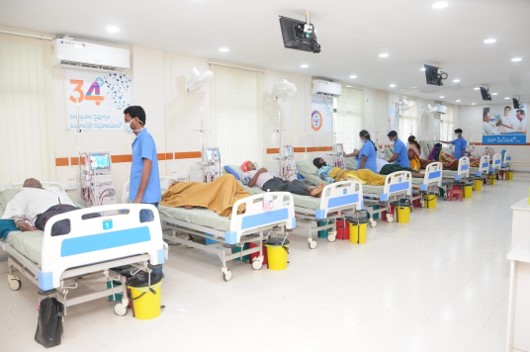Hemodialysis is the procedure that supports an individual’s excretory system when the kidneys are unable to perform their function efficiently.

Request an Appointment
Doctors and scientists working in pathology are experts in illness and disease. They use their expertise to support every aspect of healthcare, from guiding doctors on the right way to treat common diseases, to using cutting-edge genetic technologies to treat patients with life.
How is Hemodialysis performed?
In the procedure of Hemodialysis, a special filter that performs the function of the kidneys and acts as an artificial kidney known as a dialyzer, as well as a dialysis machine, is attached to the patient’s body in order to clean the blood.
In order for the blood to enter the dialyzer so as to be cleaned, the doctor needs to access your blood vessels. For this, a minor surgery is performed, usually in the arm, so as to access the blood vessels, and gain access to your blood.
How does the Dialyzer clean the blood?
The Dialyzer consists of two parts, of which one part is for the blood while the other is filled with a washing fluid known as Dialysate. The two parts of the Dialyzer are separated by a thin membrane which lets the blood cells and proteins pass through, without allowing impurities that are bigger in size to pass through, thereby cleaning the blood.
Small waste products such as potassium, creatinine, urea and other fluids that are present in the blood are separated by this procedure.
- If your blood doesn’t clot properly – it’s a haematologist who will conduct the blood tests, confirm if you have haemophilia, and offer treatment.
- When there’s an outbreak of infection in a hospital, it’s a medical microbiologist or infection doctor who will advise the infection control teams and work hard to contain it.
- For those having trouble getting pregnant – it’s a reproductive scientist who will investigate, diagnose and, where possible, treat any infertility issues.
Apollo Dialysis Clinics is the country’s first standalone Dialysis center that deals with all problems relating to Nephrology and the functioning of the kidneys. Currently, in India, almost about 1.5 lakh new patients suffer from critical stage renal failure annually. Of these, only about 3,500 patients are able to receive kidney transplants and only 6,000 are provided with adequate facilities for a dialysis.
